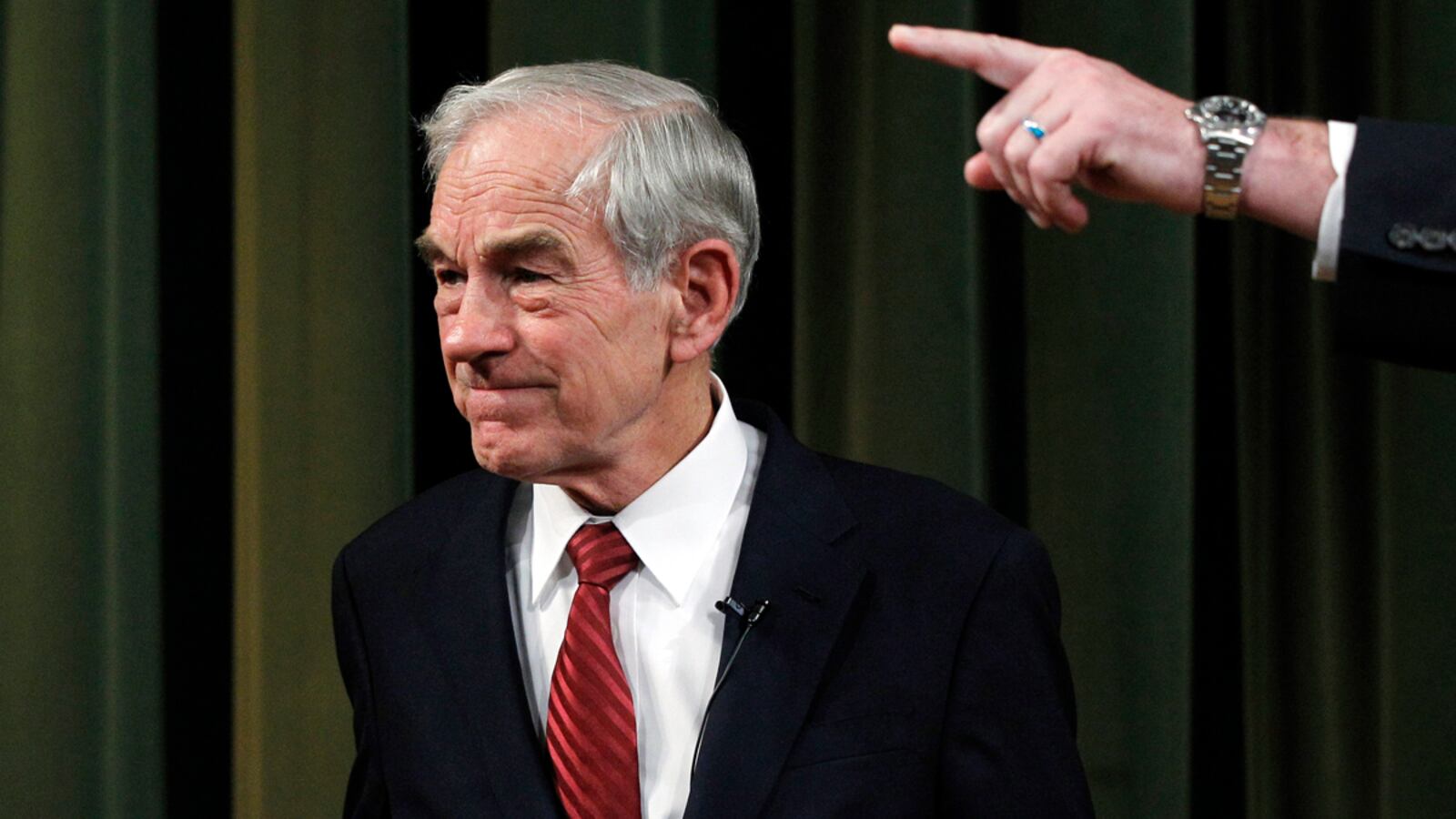Ron Paul is either tied for first, in second, or in third, according to the three most recent pollings of Iowa Republicans. How can this thin, cranky, retired obstetrician have gathered so much support against the slick, well-funded Mitt Romney or the bombastic and schoolmarm-ish Newt Gingrich?
It may be that Paul’s anti-government, “Stop Signs Are a Violation of My Fifth Amendment Rights” brand of libertarianism has found a willing audience; a conservative philosophy essentially meeting the Occupy Wall Street crowd [hashtag #OWS] around back.
NOTE: A clause of the Fifth Amendment reads, “No Person shall … be deprived of life, liberty, or property, without due process of law.”
It is no feat of analysis to suggest that Americans’ confidence in public institutions, especially governmental institutions, has waned to a point well beyond cynicism. Part of this is due to the astonishing amount of news—or what is presented as news—that is available to almost every American via cable TV or the Internet.
News, like movies, is only interesting if there is drama. No one will ever write a story for your local paper about the fact that you showed up for work each and every day last week. Go missing for a week and, like Agatha Christie and Judge Crater, you will make news.

To call what we see all day every day “bad” news is to be redundant. In Washington the drama doesn’t come from a bill passing by unanimous consent. It comes from Capitol Hill reporters shuttling back and forth through the Capitol Rotunda to cover competing press conferences (or staged leaks) on the Senate and House sides of the building until Friday afternoon, with a deadline—a government shutdown, the reimposition of payroll taxes, the holidays, or all three—looming ever larger.
A constant barrage of those stories—and they are legitimate stories to cover—has led to a growing dissatisfaction with not just what the government does, but how it goes about doing it.
Paul has developed a riff of examples showing how the modern system of American federalism has strayed so far from what the Founding Fathers had in mind that we make Sweden look like an Ayn Rand utopia.
NOTE: Sen. Rand Paul (R-Ky.) is Ron Paul’s son. Despite the coffee-shop certainty that surrounds such things, Senator Paul was not named after Ayn Rand. His official first name is Randal.
The political and economic unease facing the American people makes many pine for the good old days when you went to work after high school (or, for the lucky few, college) and stayed where you were, doing what you did, for the company that was paying you for the next 40 years until you retired with a gold watch and a pension. Wives stayed home with the 2.75 kids and had dinner ready by the time dad got home from the office or the factory in time to eat, clean up, and watch Milton Berle on Tuesday nights.
If those days ever really existed, they do not anymore, and they have disappeared so quickly that change has outstripped our ability to deal with it.
In the world of Ron Paul, the Congress should only deal with those issues that are beyond the capability of the states (10th Amendment), and even then only if specifically enumerated in the text of the Constitution or its amendments (Ninth Amendment).
The relationship between Paul and the Occupy Wall Street movement is this: government, like the major banks, has gotten too big to fail. If you want to do business in the United States, somewhere along the line you will fall under the spell of one of the major financial institutions. If you want to live in the United States, somewhere along the line you will fall under the thrall of the federal government.
If this state of affairs was working, then the tents at the Occupy sites would be folded up and the parks would empty out. Similarly, the tug and pull over health-care mandates and what kinds of light bulbs will be legal would be fodder only for graduate-school researchers.
But it is demonstrably not working. Housing prices remain low because so many houses are in foreclosure. Businesses are sitting on a reported trillion dollars in cash on their balance sheets because they don’t trust the government (ours or the European Union’s) to do anything but cause more confusion and fear.
Regular Americans look at the unemployment statistics and know that 8.6 percent is better than 9, but not as good as 4, and know that there is no such thing as job security.
Into this environment marches Paul with his message of “Americans are pretty smart and can figure out how to make a living, care for those less fortunate, feed, clothe, house, and educate their children, and do pretty much everything the federal government wants to control other than, as the preamble suggests, ‘Provide for the Common Defense.’”
The #OWS movement similarly wants to diminish the power that has been absorbed by the major banks. Like a massive black hole in the center of an enormous galaxy, the Occupy folks believe banks absorb financial and innovative energy but nothing comes back out.
Both theories have gathered strength because more and more people have come to believe the status quo is no longer working.
Even if Paul were to come in first in Iowa, it’s unlikely the other candidates will adopt some of his theories as the campaign moves through New Hampshire, South Carolina, Florida, and beyond.
Paul himself doesn’t believe his pre-caucus surge will carry him to the nomination. With GOP rules now making it likely the process will continue at least though Super Tuesday on March 6, if not all the way to June, the congressman has wondered aloud if he has the physical stamina for a political war of attrition. “The question is: am I going to hold up if I keep doing all this," according to CNN.
And if he were to win or come in a close second in Iowa, his statements such as claiming sanctions against Iran were tantamount to “an act of war”—and voting against legislation to help catch online child predators because (according to the technology site C-Net) “I have a personal belief that the responsibility of raising kids, educating kids, and training kids is up to the parents and not the state”—will generate a good deal more scrutiny. And that will diminish his impact on the campaign.






